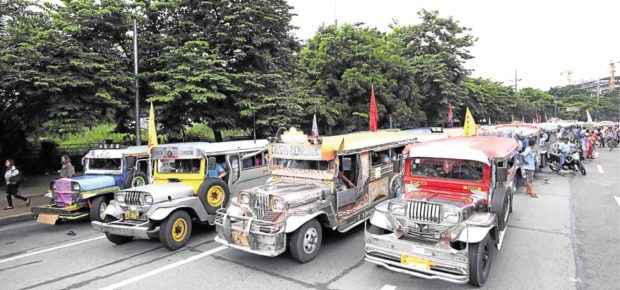Some local governments deployed buses marked “Special Trip” to ferry commuters stranded by Monday’s transport strike, which came just weeks after another strike (top photo) in July sent jeepney drivers parking their vehicles at Elliptical Circle in Quezon City. —GRIG MONTEGRANDE AND NIÑO JESUS ORBETA
Public utility jeepney (PUJ) drivers defied a government warning to keep them off future public conveyance licenses for modern versions of the iconic mode of transportation and pushed ahead with a strike that paralyzed jeepney routes, but only in one town in Bulacan province.
The striking PUJ drivers were demanding a stop to what they said was a phaseout of jeepneys but which was actually a plan to replace the aging fleet of contraptions with modern vehicles.
In Bulacan, strike organizers said 90 percent of PUJs stayed off the road, prompting the cancellation of classes in these areas—cities of Malolos and San Jose del Monte, and the towns of Sta. Maria, Marilao, Bocaue, Guiguinto and Baliwag. But work in government and private offices was not suspended.
In San Jose del Monte, the strike affected major routes, said Supt. Fitz Macariola, city police chief. But PUJs ferrying commuters to Quezon and Caloocan cities, and Norzagaray town in Bulacan were on the road.
In Meycauayan, stranded commuters were ferried to work by a city government bus and other vehicles.
In Metro Manila, authorities said only a few routes were hurt by the strike—Commonwealth Avenue, Litex, SM Fairview and Sandiganbayan all in Quezon City.
LTFRB threat
The Land Transportation Franchising and Regulatory Board (LTFRB), which issues public conveyance licenses, said drivers and operators who joined Monday’s strike would be disqualified from getting licenses to operate under the jeepney modernization program of the government.
Aileen Lizada, LTFRB board member, said licenses would be given only “to those who are worthy to be on the road.”
A memorandum order of the LTFRB prohibits public utility vehicle drivers or owners from ceasing operations “as a sign of demonstration or protest.”
The strike was spearheaded by the group Samahan ng Tsuper at Operator ng Pilipinas Genuine Organization (Stop & Go) which opposes the modernization plan.
Jun Magno, Stop & Go head, said the strike, the group’s third this year, was in protest of plans by the government to compel jeepney drivers and owners to buy new vehicles that were either electric or burn cleaner fuel.
While the government offered loans to drivers and operators, Magno said a driver earns only an average of P600 a day which was P200 short of the estimated P800 daily loan payment.
Lizada, however, said Magno’s computation was flawed.
In Manila, the city government had ordered two 6×6 trucks to be on standby to ferry stranded commuters but it turned out there was no need to as the strike fizzled out in the city.
In Caloocan, another city in Metro Manila, the city government sent at least 10 vehicles out into the streets to ferry commuters who found no PUJs plying their routes.
Schools in Caloocan and another city, Malabon, suspended classes. The University of the East campus in Caloocan also suspended classes.
In Pasay, there was heavy traffic that initially prompted commuters to wonder aloud if there was a transport strike.
“Is there a strike?” said Linoard Tinio, PUJ driver who did not join the strike. He said leaders of his group, Pasang Masda, gave no order to join the strike. “It was a normal day for us,” he said.
—REPORTS FROM CARMELA REYES ESTROPE, JOVIC YEE, MATTHEW REYSIO-CRUZ AND DEXTER CABALZA
